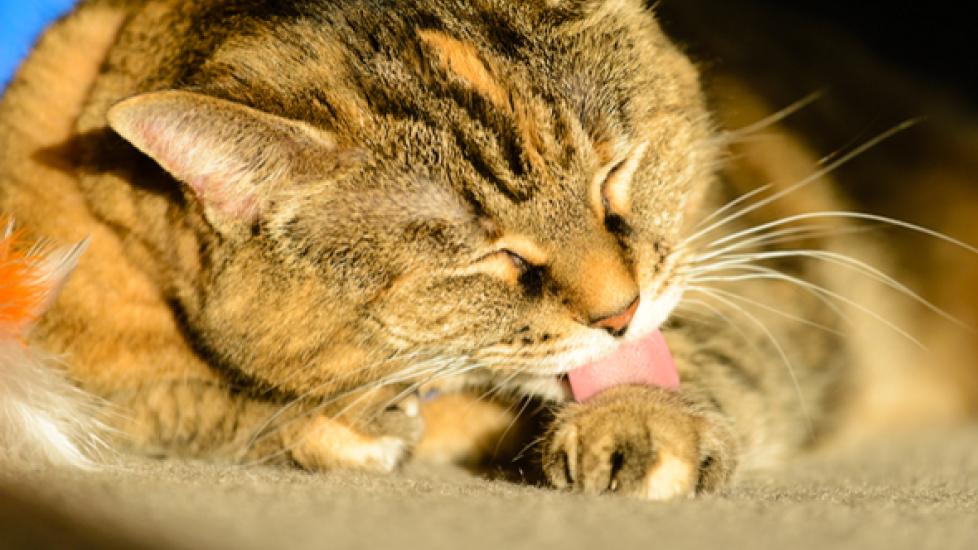Matted Fur and More: Grooming Your Senior Cat
As it is with humans, as cats grow into old age, they tend to slow down, rest more, and have more physical challenges. And just as our hair loses its luster as we age, so will a cat’s coat. In the case of our cats, however, it is not just the aging that makes the coat look less pretty. The older cat tends to change his grooming habits, resulting in matted and tangled fur. This is where pet parents can step up and help.
Learn more why senior cats might stop grooming themselves and how you can help your senior cat maintain his coat.
Why Older Cats Stop Grooming
There are many reasons your older cat might groom himself less. Older cats may find it physically more difficult to groom themselves. Many cats develop arthritis in their spine and hips, which makes the motion of grooming painful.
Cats can develop arthritis at any age, however it is more common in cats over 10 years old. The disease can affect any joint, including knees, hips, elbows, shoulders, spine, and toes. When cats experience pain moving, they can’t stretch their heads to groom certain spots like they used to when they were more limber. This can lead to areas of your older cat's coat becoming messy, dull, and unkempt.
Unfortunately, some pet parents don’t recognize their cat has arthritis because cats tend to hide illness and pain. Signs can be very subtle, including:
- Getting up more slowly
- Decreased grooming
- Litter box accidents
- Decreased jumping
- Decreased activity
Discussing the use of joint supplements for an arthritic cat, like glucosamine and chondroitin, as well as certain pain medicine for cats with your veterinarian can be helpful.
Your older cat's grooming habits may also be affected by naturally occurring increased production of oil from the skin. This can cause mats in the coat, even in shorthaired cats. This can most often be seen at the base of the tail, leading up the back, but increased oil production affects the entire body. Brittle or damaged cat hair also can become tangled and form mats.
Senior cats are also prone to obesity, which may further their difficulties in grooming. This can lead to increased dandruff, unkempt fur, and a buildup of urine or fecal material.
Many common diseases, such as kidney disease, thyroid disorders, and diabetes, can also cause decreased grooming. It is important to talk to have your veterinarian examine and review blood work for your senior cat every 6 months.
Cat that have illnesses like diabetes and hyperthyroidism typically require more frequent grooming to remove dead hair and excess oils before it mats.
Tips for Grooming a Senior Cat
How can you provide better grooming to your senior cat, and make it an enjoyable experience for both of you?
- Make grooming a pleasant experience. Pet your cat as you brush him and giving him plenty of verbal praise or cat treats throughout the grooming session. Use calm, soothing tones and avoid aggressively holding or confining your cat. Sometimes, more frequent, shorter sessions are better for both cat and pet parent and result in less anxiety for both parties.
- Brush your cat regularly. This will keep his hair neat prevent mats from forming. Daily brushing is ideal, especially with medium to long-haired breeds. Use a gentle, soft touch during brushing to avoid causing injury or discomfort. Additionally, consider getting a grooming brush that has softer bristles instead of the wire-bristled brushes.
- Don’t forget to clip your cat’s nails. Trim your cat’s nails monthly using special cat nail clippers for the task. Note that your cat’s claws will become thicker as he ages, with the outer layer of the nail sheath shedding less. This means that more regular nail trims are needed to keep the nails from becoming ingrown and painful, Paolillo says.
- Make regular vet appointments. Make regular vet appointments for exams, bloodwork, and blood pressure monitoring. Your senior cat should receive regular veterinarian exams, ideally every 6 months, to identify any underlying health concerns early. Working together, veterinarians and owners can keep their cats healthy and happy well into their senior years!
What If My Senior Cat's Fur Is Matted?
Matted fur can affect cats as they age and their grooming habits and skin oil production changes. It may be tempting to try brushing the mats out, but that may not be the best approach for your cat.
If your cat’s fur is matted, bring him to a groomer or your veterinarian, as matted fur won't go away on its own. Older cats have especially delicate skin. Improper technique and close trimming can result in lacerations or skin sloughing. It is best to allow a veterinarian or experienced groomer assess mats.
Image via John E Heintz Jr/Shutterstock.com
